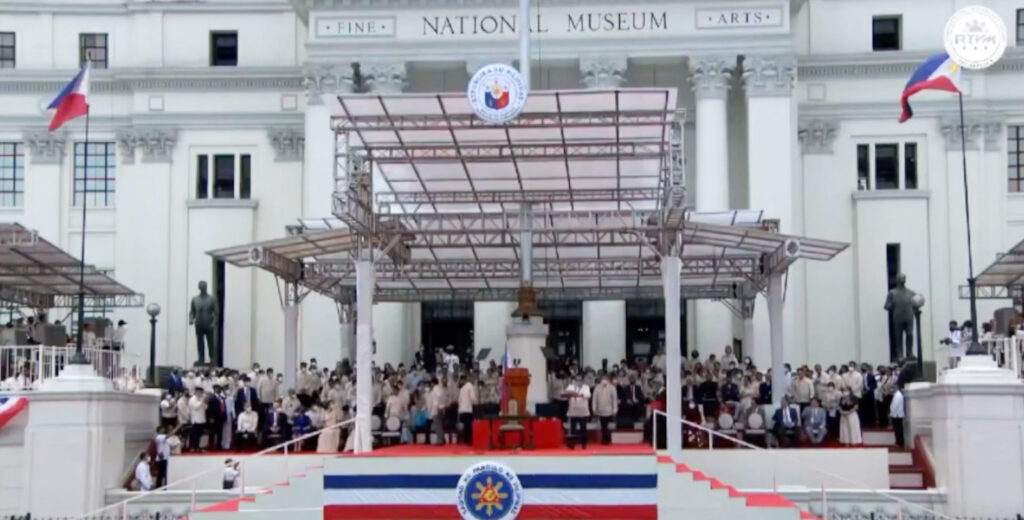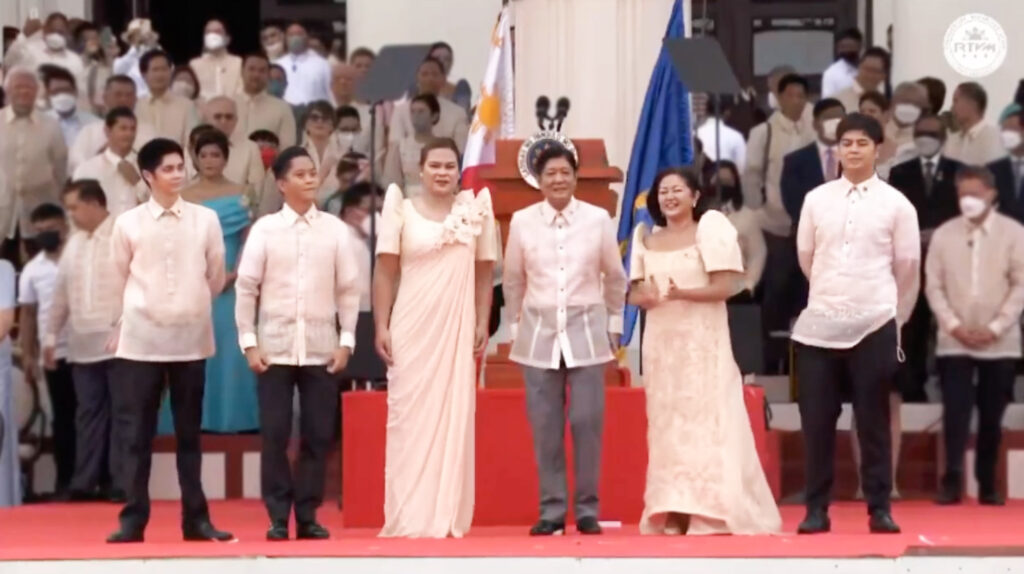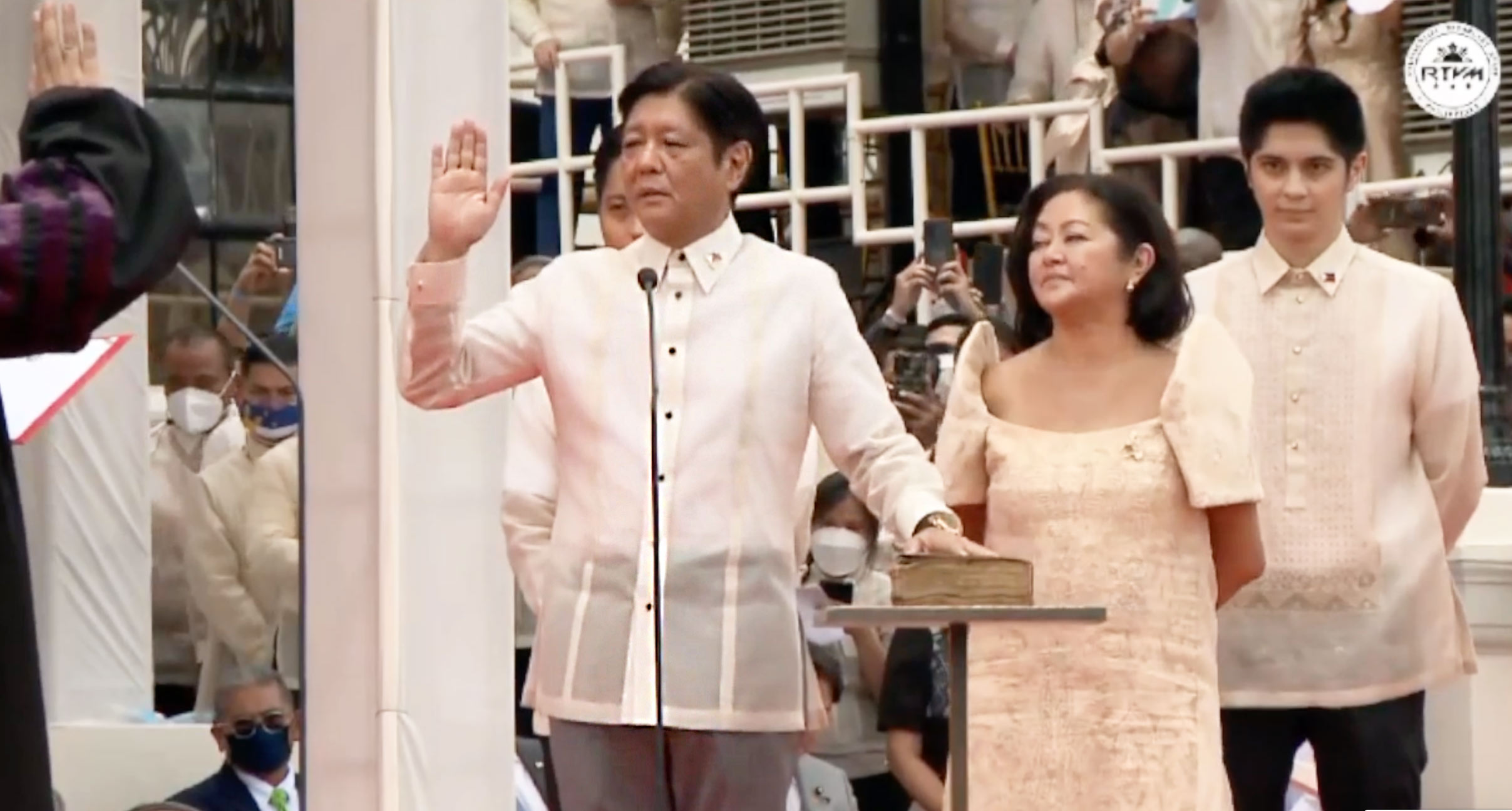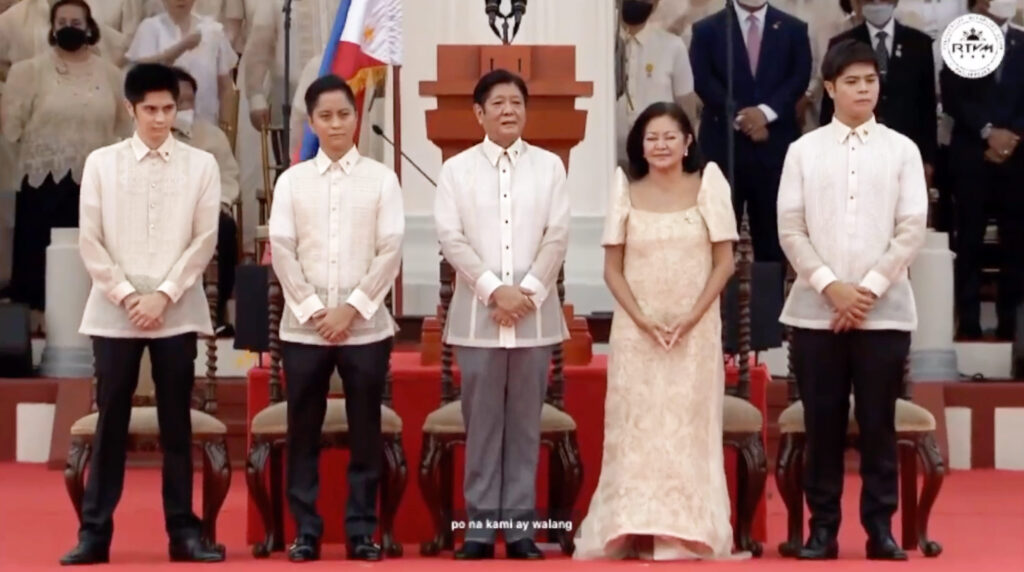Bongbong Marcos was officially sworn in as the Philippines’ 17th president earlier today, June 30, outside the National Museum building in Manila. With promises ranging from strengthening the country’s agriculture infrastructure to faster, more transparent COVID-19 response, Marcos encouraged Filipinos not to dwell too much on the past, but to instead train their sights on the future. He also vowed to unite the nation, as it continues to overcome numerous crises confronting it.
By Alvy S. Alviar
With his right hand raised and his left hand resting on an old hardbound Bible, then President-elect Ferdinand Marcos Jr., before members of his immediate family and the diplomatic community, allies and supporters, was sworn in as the country’s 17th president by Supreme Court Chief Justice Alexander Gesmundo. Running a bit behind schedule, President Marcos was sworn in a few minutes past 12 noon outside the American colonial-era building now housing the National Museum in Manila. As the old Legislative building that once housed both Congress and Senate, it was also here where his then future parents, the late President Ferdinand Marcos Sr. and former First Lady Imelda Marcos, met in the early 1950s.
Before the formal inauguration ceremony, traditions in the country regarding the smooth transition of power were mostly upheld, as outgoing President Rodrigo Duterte spent his final hours in office at Malacañang Palace waiting for his successor’s visit. At 10:30 a.m., Marcos arrived at the Palace to exchange pleasantries with the outgoing president and commence with departure honors. Marcos kept mostly to tradition, but Duterte, true to his unconventional ways, chose to skip his successor’s swearing-in ceremony by heading directly to the airport to catch a flight to his native Davao City, where he would begin a new chapter in his life as citizen Digong.

After the departure ceremony and traditional military honors, Marcos was driven to the inauguration grounds along with wife Liza Araneta-Marcos and their sons Sandro, Simon and Vincent. As the fourth president who chose to be sworn in outside the National Museum, he now joins the ranks of Manuel Quezon, Jose Laurel and Manuel Roxas. The Juan Arellano-designed building was reduced to rubble during World War II and later rebuilt.
Host-singer and ardent Marcos supporter Toni Gonzaga officially opened formal ceremonies by singing the National Anthem. It was followed by a five-minute ecumenical prayer before Marcos and his guests were treated to a civic-military parade, including a fly-by by members of the Philippine air force. Giving the highest honors it could give to a civilian, the Philippine military gave the incoming president a 21-gun salute.

As the newly sworn-in president, Marcos addressed the country for the first time in a 25-minute inauguration speech that echoed his campaign’s appeal for unity, as the country strives towards a better future. Marcos promised not to resort to excuses. He also made a pledge to work toward a “future of sufficiency” in order to revive the country’s ailing economy, post-pandemic. He likewise expressed his desire to uphold a government that not only trusts its citizens, but also works in tandem with them to “repair a house divided.”
He called out to Filipinos to unite as a nation, as he leads the country towards a better future. With a resounding “ang pangarap niyo ay pangarap ko” throughout his speech, he continuously urged Filipinos to put their full trust in him.
When it came to promises, Marcos addressed multiple sectors, signaling his administration’s priorities. They included agriculture and its twin, which is food sufficiency.
Alongside agriculture, he also promised to address hot-button issues like fuel and energy supplies. “There is a parallel problem in our energy supply. Sufficient fossil fuel-free technology for whole economies has yet to be invented and it is not seriously tried by rich countries. We will find a way. We are not far from oil and gas reserves that have already been developed,” he assured.

With Vice President Sara Duterte taking the helm as secretary of education, she was given by her boss, President Marcos, unconditional trust in further developing the country’s education system by giving importance to the sciences and vocational training. He promised as well to give more attention to OFWs, help them thrive and not fall victims to human traffickers. He also promised to rejuvenate the country’s education system to better prepare this generation, opening them up for better, less menial jobs.
Likewise, he also assured Filipinos that he would be ready to face the next pandemic should another one happen. Having contracted COVID-19 early on, he also cited the importance of the country’s healthcare workers and the dedication and hard work they continue to put in. “Our nurses are the best in the world. They acquitted themselves with the highest distinction abroad, having suffered even the highest casualties. They are out there because we cannot pay them for the same risk and workload that we have back here. There will be changes starting tomorrow,” he said.
Marcos likewise promised to continue with some of the legacies that previous administrations have started, primarily the development of more infrastructure projects around the country. “My father built more and better roads. Produced more rice than all administrations before his. President Rodrigo Roa Duterte built more and better than all the succeeding administrations succeeding my father’s. Much has been built, and so well, that the economic dogma of dispersing industry to develop the least likely places has been upturned.”
He also cited the need to address the revival of the country’s tourism sector by focusing on nature. “The recovery of Philippine tourism, with its emphasis on accessing nature’s beauty, I am sure, will exceed expectations”.
He also planned to address growing challenges the country faces with regards to pollution and its contribution to climate change. “The rich world talks a great deal but does a lot less about it than those with much less, but who suffer more death and destruction from climate change and lack of adaptation,” he said.
Marcos added: “We will look to our partners and friends to help the Philippines, who, despite having a very small carbon footprint, is at the highest risk. First spare victims and help them recover and move on to lessen the harmful impact of climate change. We, too, have our part to play. We are the third biggest plastics polluter in the world, but we won’t shirk from that responsibility. We will clean up.”

Marcos further assured the country that “I will complete on schedule these projects that have been started. I am not interested in getting credit.” Having said all of these, the newly sworn-in president promised not to disappoint Filipinos, as he would usher the Philippines into a brighter and more prosperous state.
To end his speech, Marcos punctuated it with a promise to deliver. “With every difficult decision that I make, I will keep foremost in my heart, in my mind, the debt of gratitude I owe you for the honor and responsibility that you have conferred on me.” He went on to say: “I will not spare myself from shedding the last bead of sweat or giving the last ounce of courage and sacrifice. Why am I so confident of the future? I have 110 million reasons to start with. Such is my faith in the Filipino. We will achieve a country all Filipinos deserve.”






